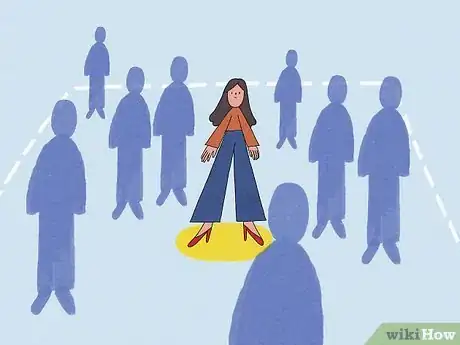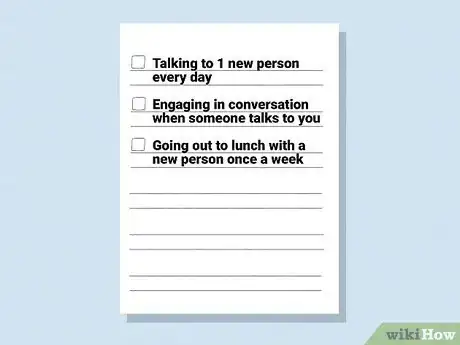This article was co-authored by Kim Chronister, PsyD and by wikiHow staff writer, Hunter Rising. Dr. Kim Chronister is a Licensed Clinical Psychologist. She specializes in helping people struggling with substance abuse, relationship problems, eating disorders, and personality disorders. Dr. Chronister has contributed to and appeared on Access Hollywood, Investigation Discovery, and NBC News. She is the author of “Peak Mindset” and “FitMentality.” She holds an MA in Clinical Psychology and a Doctor of Psychology (PsyD) from Alliant International University.
There are 10 references cited in this article, which can be found at the bottom of the page.
This article has been viewed 309,659 times.
Have you ever wanted to be the social butterfly at a party and feel comfortable meeting a lot of new people? Even if you normally keep to yourself and act introverted, there are a lot of things you can do to develop an extroverted mindset and socialize even more. We’ll start with some tips about opening up during conversations and move on to ways you can be more outgoing!
Steps
Expert Q&A
-
QuestionHow can you force yourself to be an extrovert?
 Kim Chronister, PsyDDr. Kim Chronister is a Licensed Clinical Psychologist. She specializes in helping people struggling with substance abuse, relationship problems, eating disorders, and personality disorders. Dr. Chronister has contributed to and appeared on Access Hollywood, Investigation Discovery, and NBC News. She is the author of “Peak Mindset” and “FitMentality.” She holds an MA in Clinical Psychology and a Doctor of Psychology (PsyD) from Alliant International University.
Kim Chronister, PsyDDr. Kim Chronister is a Licensed Clinical Psychologist. She specializes in helping people struggling with substance abuse, relationship problems, eating disorders, and personality disorders. Dr. Chronister has contributed to and appeared on Access Hollywood, Investigation Discovery, and NBC News. She is the author of “Peak Mindset” and “FitMentality.” She holds an MA in Clinical Psychology and a Doctor of Psychology (PsyD) from Alliant International University.
Clinical Psychologist Write down exactly what you want to get out of being more open and extroverted. Make small goals for this task, ranging from most anxiety-provoking to the least. Take small steps toward these goals—these steps can lead to larger gestures.
Write down exactly what you want to get out of being more open and extroverted. Make small goals for this task, ranging from most anxiety-provoking to the least. Take small steps toward these goals—these steps can lead to larger gestures.
Warnings
- Give yourself some downtime between seeing other people so you have a chance to recharge and don’t develop social fatigue.[18]⧼thumbs_response⧽
References
- ↑ https://www.business.com/articles/15-tips-to-become-an-extrovert/
- ↑ https://www.business.com/articles/15-tips-to-become-an-extrovert/
- ↑ Kim Chronister, PsyD. Clinical Psychologist. Expert Interview. 28 July 2021.
- ↑ Kim Chronister, PsyD. Clinical Psychologist. Expert Interview. 28 July 2021.
- ↑ https://socialself.com/blog/social-energy/
- ↑ https://www.forbes.com/sites/deborahljacobs/2012/07/24/how-to-turn-an-introvert-into-an-extrovert-or-vice-versa/?sh=54b3e0b51ba3
- ↑ https://socialself.com/blog/social-energy/
- ↑ https://socialself.com/blog/introverts-becoming-extroverted/
- ↑ https://www.wsj.com/articles/SB10001424127887324144304578621951399427408
- ↑ https://www.forbes.com/sites/averyblank/2018/07/03/seven-ways-leaders-express-their-opinion-without-being-opinionated/?sh=2111ad885ae7
- ↑ https://socialself.com/blog/introverts-becoming-extroverted/
- ↑ https://www.business.com/articles/15-tips-to-become-an-extrovert/
- ↑ https://www.psychologytoday.com/us/blog/fulfillment-any-age/201604/can-introvert-ever-change
- ↑ https://socialself.com/blog/introverts-becoming-extroverted/
- ↑ Kim Chronister, PsyD. Clinical Psychologist. Expert Interview. 28 July 2021.
- ↑ https://www.forbes.com/sites/deborahljacobs/2012/07/24/how-to-turn-an-introvert-into-an-extrovert-or-vice-versa/?sh=54b3e0b51ba3
- ↑ https://www.psychologytoday.com/us/blog/fulfillment-any-age/201902/can-becoming-extravert-make-introvert-happier
- ↑ https://www.business.com/articles/15-tips-to-become-an-extrovert/
About This Article
You can be an extrovert by watching extroverts around you and mimicking the ways they act and talk. Once you have an idea of what to do, try dedicating 15 minutes a day to being extroverted. For example, you can start with something small, like knocking on your neighbor’s door and introducing yourself, and build up to making conversation with a stranger at the grocery store. Keep in mind that it’s easier to talk to people when you already get along with them, so try joining a class or group of like-minded people where you can socialize. Additionally, try to say yes to invitations, even if they’re scary, since you may end up having more fun than you anticipate! To learn how to assert yourself in conversations, scroll down!







































































